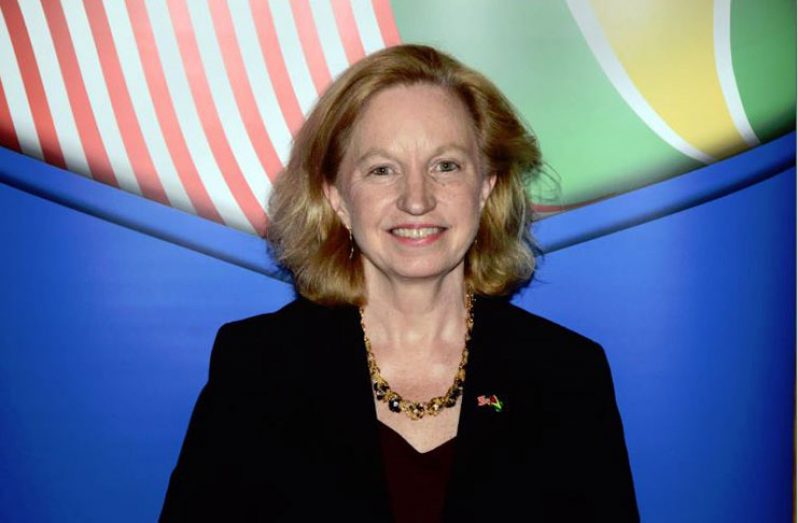…U.S praises collaboration between Guyana, DEA
…pledges more help to build capacity at anti-drug agencies
UNITED States Ambassador to Guyana, Sarah-Ann Lynch, said while Guyana has demonstrated the political will to combat the trafficking of narcotics, it currently lacks the capacity to effectively disrupt the illicit trade.
Cognisant of the challenges the country faces, she said the U.S stands resolute in its commitment to build the capacity of the Guyana Police Force, Customs Anti-Narcotics Unit (CANU) and other crime-fighting agencies. In an interview with print journalists on Monday at the U.S Embassy, the ambassador said Guyana has demonstrated political will to combat the scourge throughout the country as was stated in the U.S Department of State 2019 International Narcotics Control Strategy Report.
“When you look at Guyana, you see great commitment but lack of capacity. You need to have both at a very high level,” Ambassador Lynch said, while noting that the U.S has been working with Guyana to build its capacity through training and the provision of equipment.
According to her, there is an excellent level of cooperation between the U.S Drug Enforcement Administration (DEA) and the Guyanese authorities, and thus far, “great gains” have been recorded.
“It is an excellent way to cooperate. A large focus is on capacity building,” she told the journalists present.
According to the U.S report, during the first nine months of 2018, authorities seized 164.9 kilograms (kg) of cocaine and 889 kg of cannabis. Added to that, the authorities initiated 358 prosecutions and convicted 24 individuals for drug trafficking.
It was noted that cocaine is concealed in legitimate commodities and smuggled through commercial and private air transport, maritime vessels, human couriers, “go-fast” boats, and various postal systems.
The U.S Ambassador said the drug trade is not unique to Guyana, and together with its neighbours and other partners, there could be a massive dent in the trade. “It is a regional issue and cooperation among the South American and Caribbean actors together with us, will help us to ensure a more stable and secure Region. We are in the same neighbourhood and have the same goals of security and stability,” the U.S Ambassador said.
According to the U.S State Department Report, to advance cooperation, Guyana should take steps to implement the 2001 counterdrug bilateral agreement with the United States to suppress illicit trafficking by sea and air. The U.S has urged Guyana to enhance its anti-corruption initiatives and fully pursue prosecutions for drug trafficking in accordance with its laws.
Additionally, the report said the United States supports a wide range of efforts designed to address crime and violence affecting Guyanese citizens, primarily through the Caribbean Basin Security Initiative (CBSI). CBSI is a security partnership between the United States and Caribbean countries that seek to substantially reduce illicit trafficking, advance public safety and citizen security, and promote justice. Efforts to increase law enforcement capabilities; protect borders, air and seaports; strengthen workforce development, and promote anti-money laundering effectiveness, directly address priority concerns shared by Guyana and the United States.
“The Government of Guyana cooperates very closely with all relevant U.S. agencies and departments, but is limited by resource constraints. The current administration, which took office in May 2015, has expressed a strong willingness to cooperate with the United States on drug control, extradition, mutual legal assistance, and other international crime issues,” the US report stated.
CBSI-funded programmes support Guyana’s maritime operations by providing interdiction assets, relevant command and control systems, and associated logistical support and training. In 2018, the United States provided port and maritime training to Guyana’s Coast Guard. U.S. assistance programs also promote law enforcement professionalisation and more effective drug investigations. By strengthening Guyana’s drug control capacities, the United States seeks to enhance inter-agency coordination within the Guyana Government, including gathering better information on drug trafficking routes.
The Government of Guyana’s National Drug Abuse Control Unit trains public health officers, teachers, social workers, and civil society groups as part of the government’s supply reduction strategy. The Guyanese government has a drug enforcement presence at its international airports, post offices, and, to a lesser extent, at seaport and land-border entry points. Drug control agencies reported several interdiction efforts and drug-related seizures and convictions during the first nine months of 2018.




.jpg)









